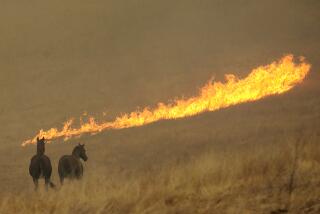Insurer May Be Liable in Shooting, Court Rules : Law: Appellate justices decide that victims of drive-by attacks can seek damages from their assailants’ auto insurers.
In a case involving a Buena Park man blinded in a drive-by shooting, a federal appellate court has ruled that victims of such shootings can seek damages from their assailants’ auto insurers.
The 3-0 decision, issued last week by the 9th U.S. Circuit Court of Appeals in San Francisco, rejects the insurance carrier’s argument that it is not liable for damages because the shooting did not arise from the use or ownership of the vehicle.
The court found that the vehicle did play an integral role in the November 23, 1984, shooting of Charles R. Keukelaar, saying that his attackers used it to drive up to him, fire the shots and then flee.
The ruling eliminates one hurdle a drive-by shooting victim would have to overcome in order to seek monetary damages from auto insurers, but other obstacles remain.
For example, lawyers said, under state law insurers cannot be held liable for willful or intentional acts, and insurers have never been found to be liable in a drive-by shooting in the state.
Keukelaar’s attorney, William B. Hanley, said the decision is a major breakthrough. “This at least allows us to get to first base, to get to the point where we can argue whether it was intentional or not.”
Officials with the insurance industry, however, denounced the court’s action.
“It’s another example of the deep-pockets type of ruling where insurance companies’ funds are being tapped to cover what’s really a societal problem,” said Robert J. Gore, vice president of the Assn. of California Insurance Companies.
“No one is sympathetic to the perpetrator of a drive-by shooting . . . but policies were never written to cover these acts,” Gore said.
Keukelaar was shot in November, 1984, near Kettleman City in Kings County as he and his fiancee were making a trip from Buena Park to Sacramento. They were traveling on Interstate 5 in his Chevrolet Corvette when they passed three Marines in a van. The Marines--Brian Painter, who was driving, and Walter A. Davis and David Roberts, had been drinking inside the van, authorities said. After Keukelaar had passed the van, Davis told Painter to pass the Corvette. As the van passed alongside the Corvette, Davis fired one round from a handgun. The bullet penetrated the rear window of the Corvette, striking Keukelaar in the back of the head.
The Marines were stopped a short time later by the California Highway Patrol and arrested.
Davis, who owned the van, was convicted of aggravated assault with a deadly weapon and sentenced to seven years in prison. Hanley said Painter was also convicted in connection with the case. Charges against Roberts were dropped.
Keukelaar, who ran a successful auto salvaging business--and was known locally through his commercials as Charlie the Junkman--suffered brain damage and was blinded.
He sued both the U.S. government and the individual Marines seeking compensation for medical and other costs. He lost the government case. An Orange County Superior Court judge last year ordered Davis and Painter to pay him a total $5.8 million in damages.
In the meantime, Davis’ auto insurance company, State Farm Mutual Automobile Insurance Co., asked a U.S. District Court judge to rule that its policy did not cover losses sustained in the shooting. The judge granted the request. The recent appellate court ruling reverses that decision and sends the case back for further action.
State Farm’s attorney, Robert D. Brugge, declined to comment on the specifics of the case, stating that the insurance company may ask the appeals court to review its decision.
On Monday, Keukelaar said he was “pretty happy. It’s the first positive thing to come out of the litigation.”
He said he hasn’t “seen a nickel” of money he won from his assailants in court. Since the shooting, he has been on disability and lost his business, he said. “I’m destitute. I lost everything. It’s been an incredible ordeal.”
More to Read
Sign up for Essential California
The most important California stories and recommendations in your inbox every morning.
You may occasionally receive promotional content from the Los Angeles Times.










